Why worry about that Back-to-The-70s Show?
The Charger R/T E49 engine produced remarkable torque on a seven bearing configuration which enabled considerable power development previously unobtained from 6-cylinder engines and not surpassed until the Porsche Turbo 911 (300) release of 1975.
- Charger R/T E49: 265 cu in (4.3 L) HP base engine (302 bhp (225 kW), 4spd manual, $3975.00
- Charger 770 SE E55: 340 cu in (5.6 L) 4bbl V8 engine (275 bhp (205 kW), 3spd automatic, $4850.00
Ever the value-oriented investor, I would have gone for the Charger R/T E49 4spd manual.
Too bad mowing Dad's lawn did not pay as well as Warren's Washington DC paper round.
I could afford the cushion to see over the steering wheel, but not the car.
Hey Charger!
What on Earth just happened to Reality?
Previously, reality only happened on television, and you did not need to be there.
You could kick back, in the bunny slippers, with a nice cup of tea, and not a care in the world.
However, lately, a little at a time, and then suddenly, all at once, the world started going crazy.
Prices went up, and then up some more. They are still going up.
Some idiot started a war, and then everybody wanted a war of their own.
The government, bless them, decided to be helpful and take over your life and business.
Thankfully, we don't have high unemployment.
Yet.
In most other respects, this world today looks awfully like the one I grew up in.
For those who never visited the 1970s before, here is a brief low-down.
- East Keilor was not a desirable Melbourne fringe suburb.
- Vidal Sassoon was not a manufacturer of upscale wind instruments.
- Saint-Tropez was somewhere people would happily go spend a whole roll of Kodachrome.
- Macramé is not something friends let their friends do, especially not in a Velour pantsuit.
If you were cognizant of these facts, life was pretty good, apart from the bill.
Inflation was crazy, and unemployment was high and going higher.
There was a big Made in Australia campaign, but the best jobs were in government.

Government was large, with plenty of jobs, and the pay was indexed to inflation.
In the 1970s, it was not a good idea to try and work for a living.
The idea of "Working-for-a-Living" was strictly for the mug punters.

What do we have to look forward to?
I am very keen on Generative Artificial Intelligence.
Using that, you could make a jive-talking cabbie that was fun to ride with.

On the other hand, you probably want a job with your wages indexed to inflation.
I can think of two such vocations:
- Work for the government on making the world a better place.
- Start a cash-crop business whose product the punters cannot do without.
Seriously though, there is plenty of opportunity to come, as the future will not be a simple repeat of the past. We have similar policies, but a different world.
The outcome will not be identical.
Those who say otherwise are doomed to write investment research.
Others may figure out how to tap dance, throw knives, and do investment research.
Look through the Overton Window to what comes next!
I was first introduced to the concept of the Overton window by a good friend in Perth.
He is a thoughtful individual, very well read, and a successful entrepreneur.
The key to starting new businesses is to have a good hunch as to what comes next. This is not the same as "seeing the future", but "recognizing the present".
What trends will persist for long enough to organize a business to profit?
Some may view this as a "gift", but I disagree. I think it is a "skill" to be developed.
This skill involves cultivating your human powers of observation and inquiry.
My friend in Perth has done this very well, and I am always alert to his insights.
The Overton window is the range of policies politically acceptable to the mainstream population at a given time.
That is plain enough, but here is the kicker:
It is also known as the window of discourse.
This is the key to understanding the machinations of government policy.
The window of discourse is just a function of what the public will presently accept.
You start by talking up a Cold War, and then deliver World War III.
I am cynical about this method to manufacture consent to policies that may not actually benefit the public, but which certainly benefit their advocates.
To see through the Overton Window, you need to step outside and look inside the machine.
The task is to spot the stage rig and wires, those pulling the levers, and maybe read the script on the teleprompter. Just follow the bouncing ball.
This requires a perspective which is not part of the mainstream and the chutzpah to follow through on relating the insights which stem from such a perspective.
The persona of a tap-dancing knife thrower is taken. That one is done.
I need a different one if I am going to not-work-for-a-living.
Years ago, I invented a nom de plume for a market sentiment indicator I had developed.
You can read about that here, here and again over here.
That name was savvy yabby, which I have always wanted to use in my investment career.
I liked this idea so much that I started a new line of business via an investment newsletter.

The blue yabby is a common sighting in the more luscious of Australian native rainforests.
They keep to themselves, searching for tasty morsels in streams and forests. They bring a pair of very powerful claws that are capable of cracking any nut. Their scientific name is:
Cherax Destructor!
When I first learned that name, I was struck dumb. It is just beyond cool, to me.
If am ever reincarnated, I want to come back as a yabby.
For now, I will moonlight as The Savvy Yabby, so far as the newsletter is concerned.
Cannot tap dance. Cannot throw knives. Can crack gnarly nuts by the dozen.
Here comes the Inflation Nation
There are many who are baffled by the notion that we should look back fifty years for a better view of the future. There are two basic views of progress:
- progress is a constant upward sloping line where the future is always better than the past
- progress is a constant struggle against the cyclical forces of regression to the mean
Armed with the printing press for free credit creation, many Western policymakers remain of the view that retrograde motion is not possible.
Progress is ever onwards and upwards.
The truth surely lies with a nuanced view that pits similarity versus difference.
“History Doesn't Repeat Itself, but It Often Rhymes” – Mark Twain
I was reminded of this dictum at a recent investment committee meeting of Sydney advisory firm Evergreen Consultants. Economist Dr. Peter Mavromatis presented a splendid chart recalling the tension between today and the 1970s.
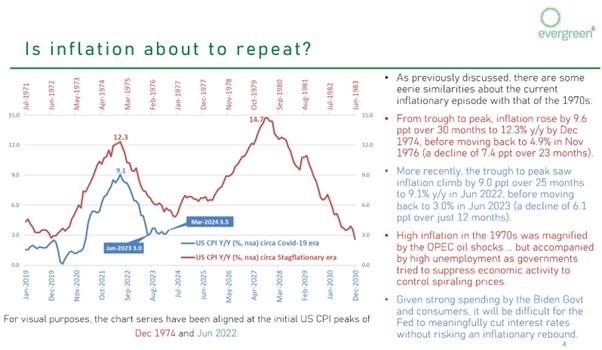
Earlier in this tale, when inflation was just getting started, we were assured that no real action was needed as it was supply-chain related, and therefore temporary.
Indeed, Xi Jinping did his bit, and the tradeable component of inflation is now well down.
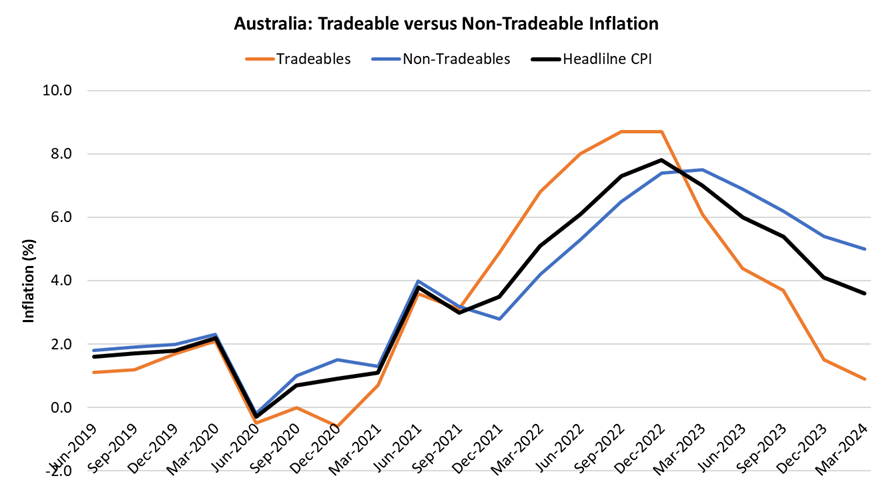
The tradeable piece of inflation largely represents the stuff coming in by ship or air. This is not just China sourced product, but a good chunk is. That is well down, condition normal.
However, before allowing the RBA or the government any victory lap, we should recognize that the fall in the tradeable component of inflation had very little to do with them.
That was the China price at work making imported goods cheaper.
The non-tradeables piece is the one we should focus on to measure domestic policy progress.
This scorecard is not so great. It fell from 5.4% year-on-year in the December quarter to 5.0% in the March quarter. That is 2.5% above the centre of the RBA target range of 2-3%. This is the piece that remains stubbornly high. It relates to rental rises, service prices and wage costs.
The Back to the 70s script remains on track.
This is not nostalgia talking. Nobody who lived through it would want the 1970s back again.
The problem is that, when history does repeat, to the extent that it does, this is usually down to a similarity in financial conditions, social conditions, and policy settings.
When you do the same things, you are likely to get similar results.
You could ask why any government would choose self-defeating policy.
I often do but am left with this simple answer.
National complacency leads to the glib acceptance of self-destructive policies.
Th best way to get bad times, is to start with good times, and then do what is popular.
Money printing is very popular.
Grants and subsidies are very popular.
Tax cuts and handouts are very popular.
Jingoism and blaming others for your troubles is extremely popular.
In short, there are few policies that are popular that involve short-term pain for future gain.
Some weeks ago, I wrote this commentary:
The investment opportunity is a reversal of the previous global disinflation shock. The geopolitical pressures of the time have famously elevated national security concerns over the economy. Policies to reshore manufacturing, or friend-shore into more expensive locations, will raise goods prices.
On cue, and true to the prevailing 1970s vibe, Treasurer Jim Chalmers wrote an opinion piece on the Future Made in Australia policy initiative. This policy will be about encouraging investment in manufacturing and discouraging the wrong kind of foreign capital.
The critical minerals industry policy was about discouraging Chinese investment.
That has succeeded in achieving the policy objective.
There are now legions of projects stalled at the final step of securing equity finance to complete the mines due to a lack of committed offtake from non-Chinese buyers.
I warned about this, as any sensible investor would.
The progress of populism for social regression is about not listening.
When you resolutely ignore the lessons of history you can most definitely repeat it.
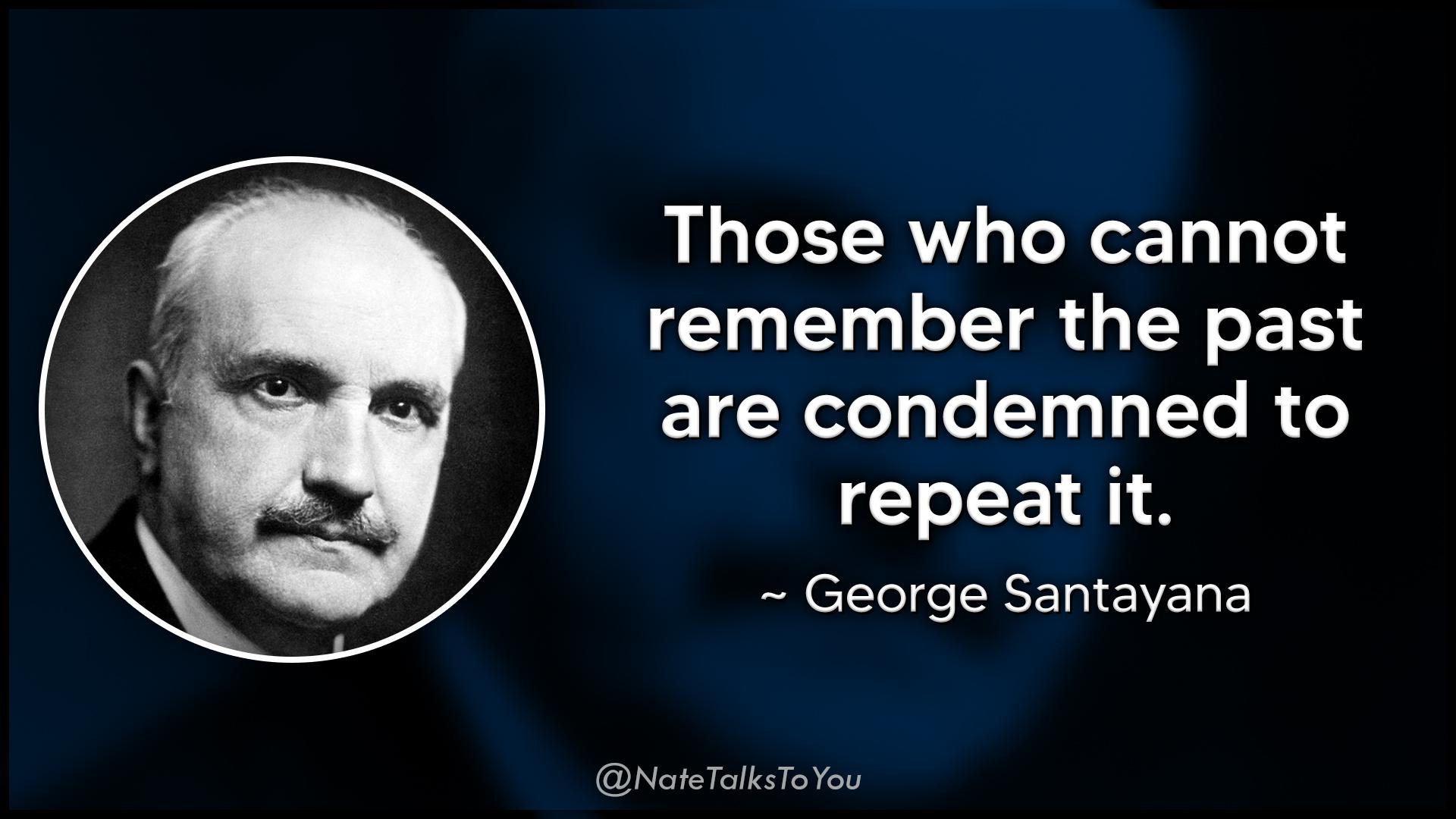
The crowd is always right, and we have been told that crowds are wise.
I won't dwell on this topic any further. That notion is populist bunk.
There is one commodity that has a habit of reasserting its presence in times of stress.
Gold is clearly in a bull market.
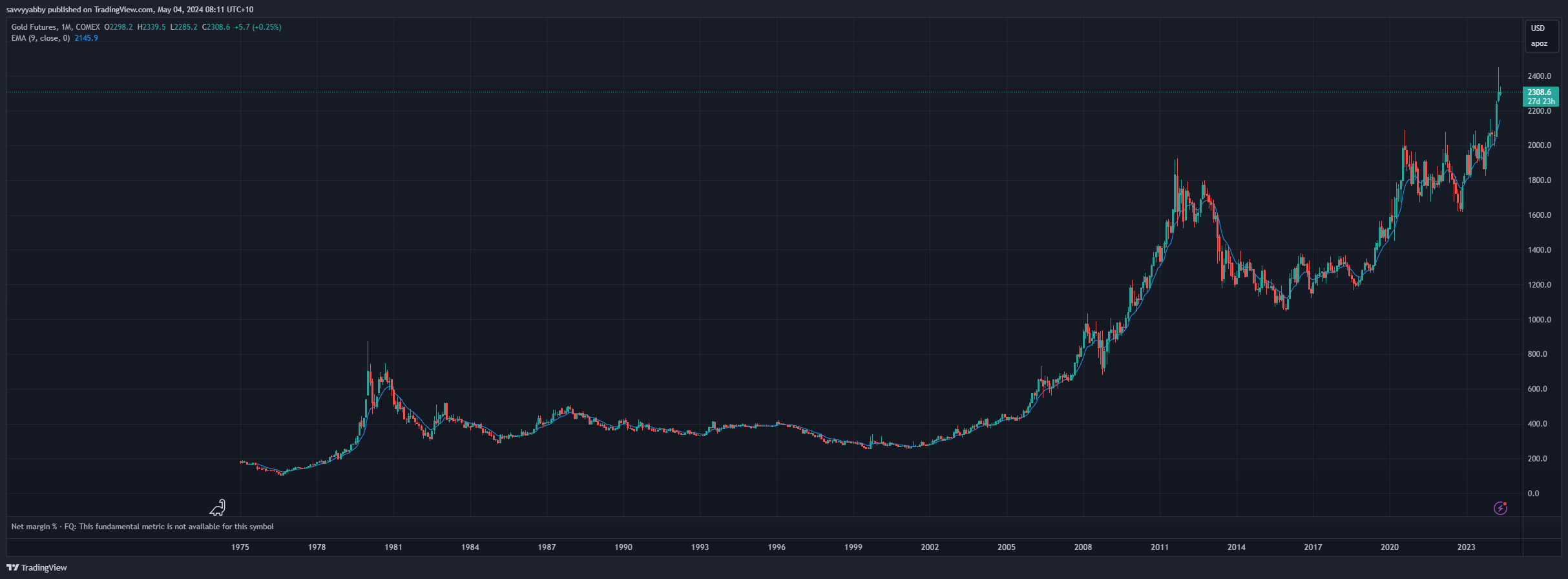
Of course, many commentators are "puzzled" or "mystified" by this turn of events.
They have checked their models, and they believe that you must have negative real interest rates. Indeed, that does help, but you may need to check if you have measured inflation correctly. If you just subtracted the government sourced inflation rate, you may have a poor read on the true state and character of the inflation under way in many Western nations.
The above chart for gold was denominated in US Dollars.
Here it is in Australian dollars.
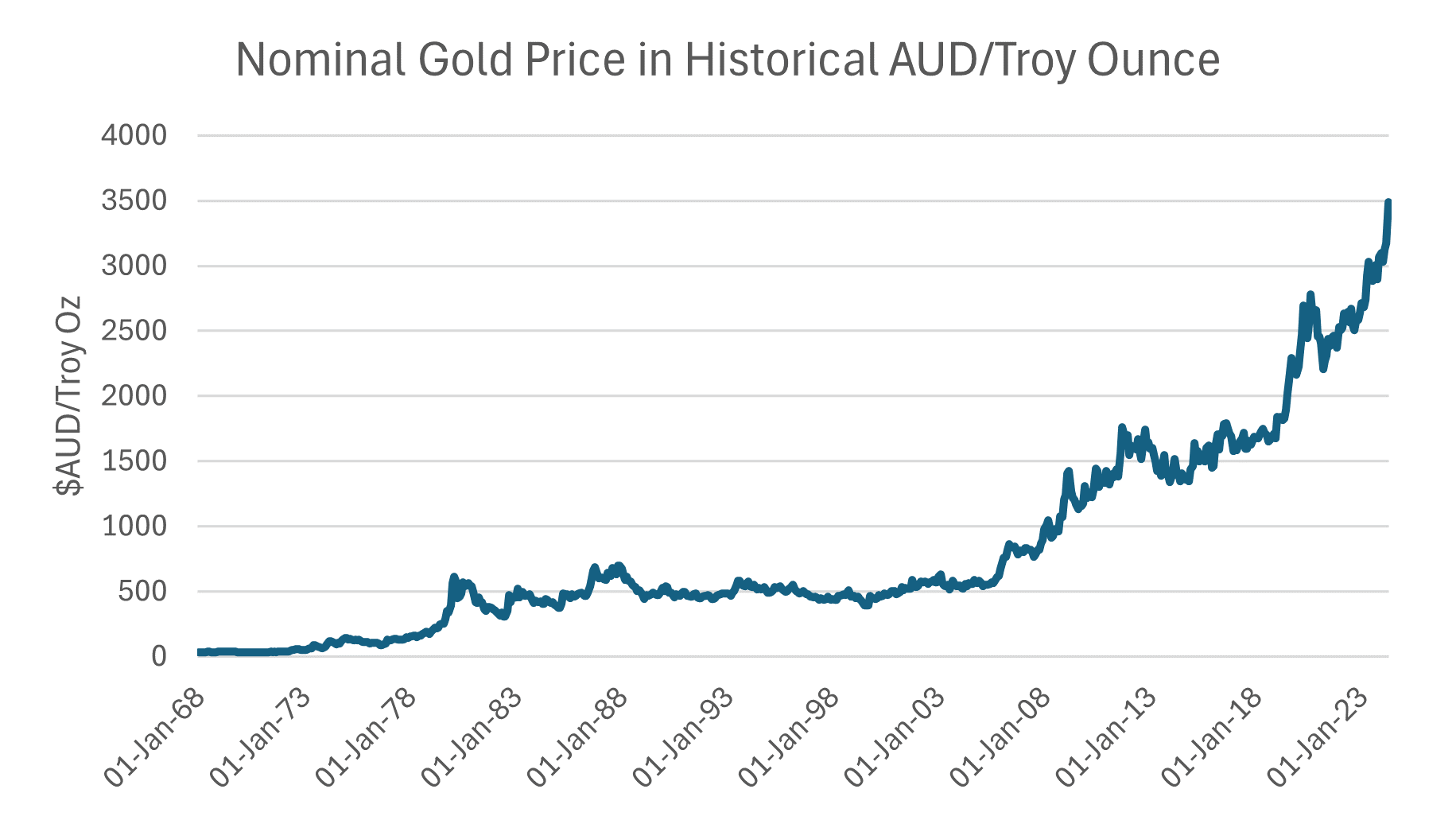
Australian monetary policy is often celebrated as being world-leading, due to the absence of recessions from our recent past. However, we are now a nation with land prices that are too high to support ready expansion of our built environment. Housing is very expensive.
When housing is expensive, labour will soon become expensive.
When your national government pursues restrictive energy policies, and discourages new wells for natural gas, you will soon have high energy prices.
With high land, labour and energy prices, manufacturing is not competitive. If you choose expensive local solar cells over cheap, high quality, Chinese panels energy will be expensive.
The problems simply compound, policy error on policy error.
The best way to make an already bad situation worse is to pretend that you would be better off not selling your plentiful minerals to China, to buy cheap, high quality, electric vehicles.
If you do all of that, precisely as we are, your economy is not going to remain strong.
The last resort will be currency devaluation to do what the RBA cannot do.
This will impose the necessary pain, over perhaps a decade, to (re)learn the lessons on how this world actually works for an electorate that prefers bedtime stories over reality.
You don't need to be a genius to forecast any of that.
You just need to be sentient, and to look out the window.
Investment Strategy
Monetary inflation, tariff barriers and preferred treatment with tax breaks and subsidies, are actually good for selected stocks, in the short run.
However, this sugar hit does not last.
There is an old Scandanavian proverb to this effect:
Don't wet your own pants in a blizzard just to stay warm.
That is what we in Australia are doing right now.
Over in the USA, I think that the Biden Inflation Reduction Act (IRA) will have a similar result. There has been huge capital expenditure in new semiconductor fabs and electronics plants that were uneconomic the moment the first plod of earth met the presidential shovel.
I say this because we know this.
The laws of economics will not be repealed simply because it is popular to blame our own troubles on the existence of China. They have their own problems.
China is not likely to stop pushing forward on expanding the production frontier for goods at ever higher levels of quality, and a lower price point.
We can complain. They don't care.
What they do care about is sourcing minerals and selling goods.
Formerly, we did very well, as a nation, selling them minerals to buy goods.
Now, it would seem, we don't want to do that anymore.
That is not my decision, so I am prepared to accept that I have no control over it.
The only control I do have is on where I put my money.
Part of that is going to go into gold and Australian gold miners. This is because that is one area where the Australian made logic works.
We already do the entire supply chain here. We mine, smelt and refine 99.99 fine gold.
China is the largest gold market globally, and they consume about three times as much gold as they mine, even though they are the largest gold producer.
Given the track record of the RBA keeping interest rates too low and pointing to the CPI as the proof of good management, I expect higher inflation for longer.
Australian assets will be challenged by a weaker domestic currency.
For selected exporters, this is good.
For gold miners, these conditions are fantastic.
Let us see how things turn out, but I am becoming more bullish on gold by the day.
The disconnect between government policy and reality has rarely been wider.
That 70s show is getting a re-run.
The unbelievable can happen to you.

1 topic
